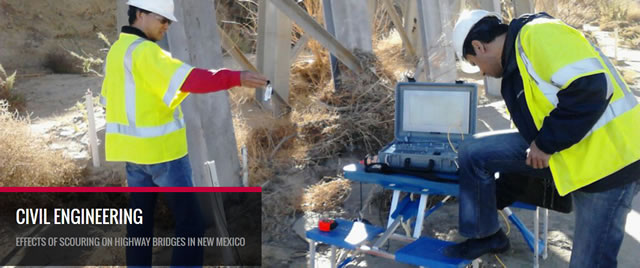
Civil Engineering ETDs
Publication Date
Spring 4-14-2017
Abstract
Nutrient uptake in streams and rivers is controlled by complex transport dynamics and biogeochemical interactions, which together regulate nutrient export from watersheds. Decoupling the relative contributions of transport and biogeochemical processes to nutrient uptake at the watershed scale has been challenging due to the spatial and temporal heterogeneity of physicochemical properties. Furthermore, logistical constraints have resulted in solute-specific analyses, primarily concentrated in headwater streams, that disregard the role of stoichiometry in controlling biological uptake. We used experimental mesocosm (column experiments) along the Jemez River-Rio Grande continuum (1st-8th stream order) to isolate spatial differences in biological nitrate uptake. Columns were constructed out of PVC, packed with gravel, silica sand and native sediments, and colonized in-situ for three months to allow the establishment of native microbial communities from each stream order. After incubation, we conducted two sets of tracer additions in each column under uniform flow conditions to analyze nitrate uptake for nitrate only injections and for stoichiometrically ‘balanced’ (106C:16N:1P) resource supply injections (i.e., nitrate vs Redfield experiments). We quantified NO3-N uptake kinetics using the TASCC method. We observed higher ranges of NO3-N uptake velocities relative to concentration during Redfield experiments. Highest nitrate uptake was observed in 7th order mesocosms packed with native sediments = 0.05 mm min-1). Nitrate kinetics predominantly followed Michaelis-Menten patterns. The comparison of the two injection experiments suggested that biological NO3-N processing was generally co-limited and the limitation varied with stream order and type of substrate. Our results support the notion that natural stoichiometric imbalances limit nutrient uptake in lotic systems and may explain the lack of scaling patterns observed in solute-specific nutrient uptake analyses.
Keywords
nutrient processing, river continuum, nutrient spiraling
Document Type
Thesis
Degree Name
Civil Engineering
Level of Degree
Masters
Department Name
Civil Engineering
First Committee Member (Chair)
Ricardo González-Pinzón PhD
Second Committee Member
David Van Horn PhD.
Third Committee Member
Tim Covino PhD.
Fourth Committee Member
Jose Cerrato PhD.
Recommended Citation
Garayburu Caruso, Vanessa A.. "HYPORHEIC NITRATE UPTAKE AND STOICHIOMETRIC LIMITATIONS: MESOCOSM EXPERIMENTS ALONG A RIVER CONTINUUM.." (2017). https://digitalrepository.unm.edu/ce_etds/164
